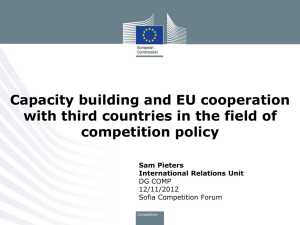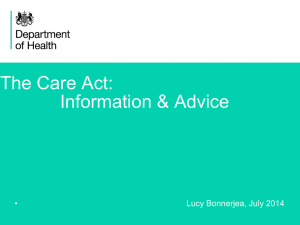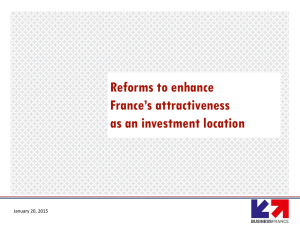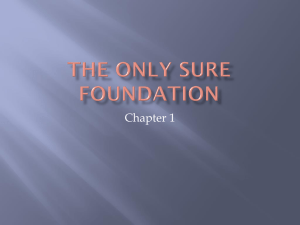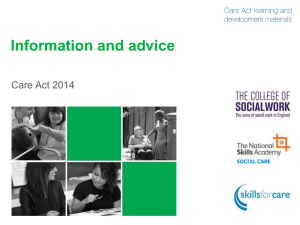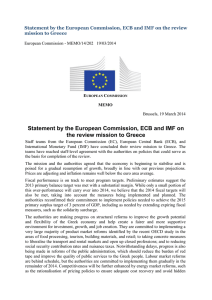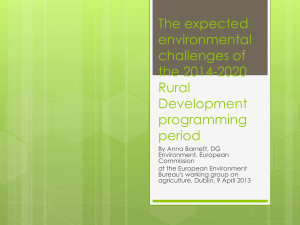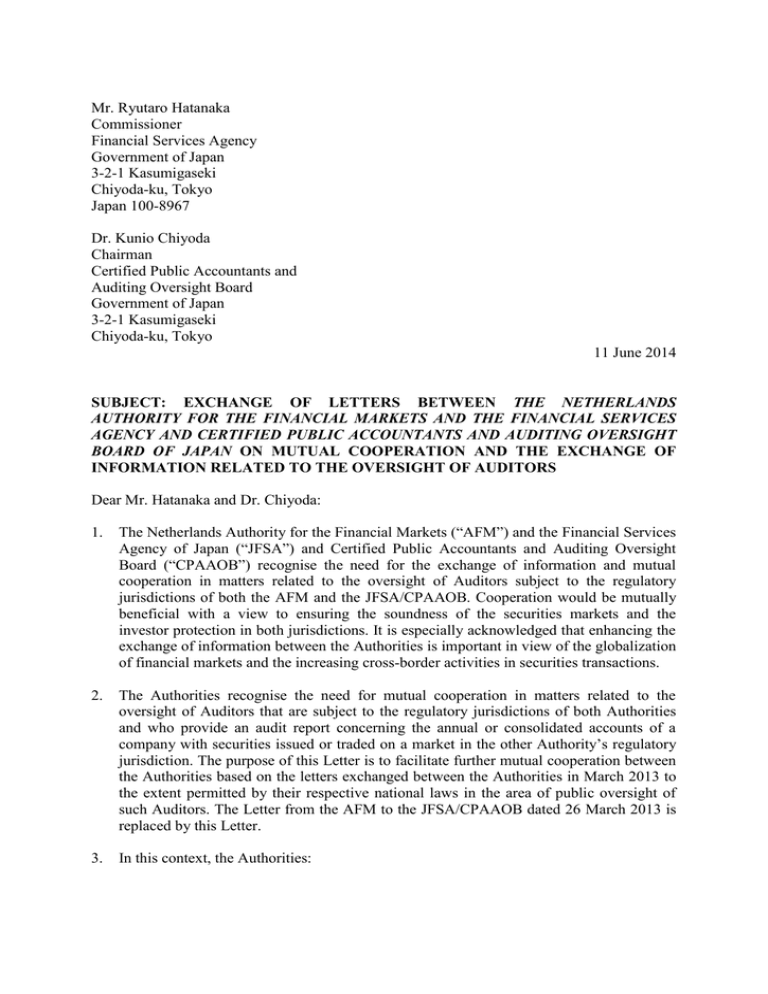
Mr. Ryutaro Hatanaka
Commissioner
Financial Services Agency
Government of Japan
3-2-1 Kasumigaseki
Chiyoda-ku, Tokyo
Japan 100-8967
Dr. Kunio Chiyoda
Chairman
Certified Public Accountants and
Auditing Oversight Board
Government of Japan
3-2-1 Kasumigaseki
Chiyoda-ku, Tokyo
11 June 2014
SUBJECT: EXCHANGE OF LETTERS BETWEEN THE NETHERLANDS
AUTHORITY FOR THE FINANCIAL MARKETS AND THE FINANCIAL SERVICES
AGENCY AND CERTIFIED PUBLIC ACCOUNTANTS AND AUDITING OVERSIGHT
BOARD OF JAPAN ON MUTUAL COOPERATION AND THE EXCHANGE OF
INFORMATION RELATED TO THE OVERSIGHT OF AUDITORS
Dear Mr. Hatanaka and Dr. Chiyoda:
1.
The Netherlands Authority for the Financial Markets (“AFM”) and the Financial Services
Agency of Japan (“JFSA”) and Certified Public Accountants and Auditing Oversight
Board (“CPAAOB”) recognise the need for the exchange of information and mutual
cooperation in matters related to the oversight of Auditors subject to the regulatory
jurisdictions of both the AFM and the JFSA/CPAAOB. Cooperation would be mutually
beneficial with a view to ensuring the soundness of the securities markets and the
investor protection in both jurisdictions. It is especially acknowledged that enhancing the
exchange of information between the Authorities is important in view of the globalization
of financial markets and the increasing cross-border activities in securities transactions.
2.
The Authorities recognise the need for mutual cooperation in matters related to the
oversight of Auditors that are subject to the regulatory jurisdictions of both Authorities
and who provide an audit report concerning the annual or consolidated accounts of a
company with securities issued or traded on a market in the other Authority’s regulatory
jurisdiction. The purpose of this Letter is to facilitate further mutual cooperation between
the Authorities based on the letters exchanged between the Authorities in March 2013 to
the extent permitted by their respective national laws in the area of public oversight of
such Auditors. The Letter from the AFM to the JFSA/CPAAOB dated 26 March 2013 is
replaced by this Letter.
3.
In this context, the Authorities:
-
Recognise that the European Commission has decided upon the equivalence referred
to in Article 46(1) of the Directive 2006/43/EC in respect of Japan 1 and that the
conditions under which the requirements of Article 45(1) and (3) will be disapplied or
modified must be set in a cooperative arrangement as referred to in Article 46(3) of the
Directive 2006/43/EC between the Member State and Japan and communicated to the
Commission;
- Recognise that the European Commission has decided upon the adequacy referred to
in Article 47, paragraph 1(c) of the Directive 2006/43/EC in respect of Japan in the
Commission Decision of 5 February 2010 on the adequacy of the competent
authorities of certain third countries pursuant to Directive 2006/43/EC of the
European Parliament and of the Council;
4.
-
Recognise that the JFSA/CPAAOB has decided on 9 July 2013 that the audit and
public oversight systems for Auditors in the Netherlands are equivalent to the
corresponding systems in Japan;
-
Recognise that the letters were exchanged between the Authorities in March 2013 to
ensure that necessary information can be provided by both Authorities to the extent
permitted by their respective national laws in the area of public oversight of such
Auditors; and
-
Recognise that through this Letter, the Authorities agree to provide mutual cooperation
in a reciprocal manner.
With regard to the exchange of information, the Authorities:
- Acknowledge the Certified Public Accountants Act (“CPA act”) in Japan under which
the JFSA/CPAAOB in certain conditions is allowed to transfer to the AFM
information relating to Auditors that fall within the regulatory jurisdiction of both
Authorities;
- Acknowledge the Wet toezicht accountantsorganisaties (“Wta”) in the Netherlands
which allows the AFM under certain conditions to transfer to the JFSA/CPAAOB
information relating to Auditors that fall within the regulatory jurisdiction of both
Authorities;
- Recognise that the transfer of personal data from the AFM to the JFSA/CPAAOB has
to be in accordance with the Wet bescherming persoonsgegevens implementing
Directive 95/46/EC, and in particular Chapter IV of Directive 95/46/EC; and
- Recognise that the transfer of personal data from the JFSA/CPAAOB to the AFM has
to be in accordance with the Act on the Protection of Personal Information Held by
Administrative Organs.
1
Commission Decision of 19 January 2011 on the equivalence of certain third country public oversight,
quality assurance, investigation and penalty systems for auditors and audit entities and a transitional
period for audit activities of certain third country auditors and audit entities in the European Union;
Member States may disapply or modify on the basis of reciprocity the requirements of Article 45(1)
and (3) in relation to the auditors and audit entities of the third country or territory.
5.
This Letter does not create any binding legal obligations, nor does it modify or supersede
any Laws or regulations in the Netherlands or Japan. This Letter does not give rise to a
right on the part of the AFM, the JFSA/CPAAOB or any other governmental or nongovernmental entity or any private person to challenge, directly or indirectly, the degree
or manner of cooperation between the AFM and the JFSA/CPAAOB.
6.
The Authorities have confirmed the framework for the protection of personal data which
consists of the ‘Exchange of Letters’ and the attached ‘Annex: Framework between the
AFM and the JFSA/CPAAOB on the transfer of certain personal data’.
I
7.
DEFINITIONS
For the purpose of this Letter,
“Auditor” means a natural person or an audit firm that is subject to an Authority’s
regulatory jurisdiction in accordance with the Wta and the CPA act;
“Authority” or “Authorities” means the AFM and/or the JFSA/CPAAOB;
“Information” means public and non-public information which includes but is not
limited to (1) the outcome of Inspections and Investigations, including information on
firm-wide quality control procedures and engagement reviews, and (2) audit working
papers or other documents held by Auditors, provided that the information relates to
matters that are subject to the regulatory jurisdictions of both Authorities;
“Inspections” refers to external quality assurance reviews of Auditors generally
undertaken on a regular basis with the aim of enhancing audit quality;
“Investigations” refers to non-criminal investigations in response to a specific suspicion
of infringement or violation of laws, rules or regulations related to audit oversight;
“Laws or regulations” means any laws, rules or regulations in force in the respective
countries of the Authorities.
II
COOPERATION
Exchange of information
8.
Cooperation may include the exchange of Information between Authorities for the
purposes permitted or required by Laws or regulations on public oversight, Inspections,
and Investigations of Auditors.
9.
The Authorities acknowledge that under Dutch law Auditors are not allowed to transfer
non-public information directly to the JFSA/CPAAOB, but shall transfer such
information through the AFM.
10. In cases where non-public information requested may be maintained by, or available to,
another Authority within the country of the requested Authority, the Authorities will
endeavour to provide the information requested, to the extent permitted by Laws or
regulations in their respective countries.
11. The Authorities will use their best endeavours to notify each other, prior to or
immediately after taking any significant public oversight measures, in respect to relevant
Auditors that are registered/notified or seek registration/notification in the other country.
12. This Letter does not prohibit the Authorities from taking measures with regard to the
oversight of Auditors that are different from or in addition to the measures set forth in
this Letter. In all instances the Authorities will endeavour to notify each other prior to or
immediately after taking any significant public oversight measures.
Mutual reliance
13. The Authorities will rely on the oversight of the Auditors in their home country and
therefore refrain from public oversight activities (other than the registration of an
Auditor) 2 , Inspections, and Investigations with respect to Auditors from the other
country:
a) to the extent permitted by their respective national Laws or regulations; and
b) except for circumstances where there is no certainty that material information would
be provided under the terms of this Letter, or or when the preconditions set out in
paragraph 3 are not likely to be fulfilled.
Requests for information
14. Requests will be made in writing (including email) and addressed to the contact person of
the requested Authority.
15. The requesting Authority should specify the following:
(a) the Information requested;
(b) the purposes for which the Information will be used;
(c) the reasons why the Information is needed and, if applicable, the relevant provisions
that may have been violated;
(d) an indication of the date by which the Information is needed;
(e) to the best of the knowledge of the requesting Authority, an indication of whether the
Information requested might be subject to further use or disclosure under paragraphs
20 to 25.
Execution of requests for information
16. Each request will be assessed on a case by case basis by the requested Authority to
determine whether information can be provided under the terms of this Letter. Each
Authority will endeavour to provide a prompt and adequate response to information
requests from the other Authority. In order to avoid unnecessary delay, the requested
Authority will provide appropriate parts of the requested information as they become
2
The registration of an Auditor will continue to follow the procedures required in each country.
available. In any case where the request cannot be met in full within the desired time
period, the requested Authority will inform the requesting Authority accordingly and will
consider whether other relevant information or assistance can be given.
17. The requested Authority may refuse to act on a request where:
(a) it concludes that the request is not in accordance with this Letter;
(b) acceding to the request would contravene Laws or regulations of the requested
Authority’s country;
(c) it concludes that it would be contrary to the public interest of the requested Authority's
country for assistance to be given;
(d) the provision of information would adversely affect the sovereignty, security or public
order of the requested Authority’s country; or
(e) judicial proceedings have already been initiated in respect of the same actions and
against the same persons before the Authorities of the country of the requested
Authority.
18. The requested Authority will promptly inform the requesting Authority of the reasons
why it refuses to act on a request made under this Letter.
19. Communication between the Authorities will be in English. If the requested Authority
needs to provide information and/or documents in a language other than English, the
requested Authority will inform the other Authority to that effect in advance. When
information and/or documents provided are in a language other than English, the
requesting Authority bears the costs of translation.
III
CONFIDENTIALITY
20. Each Authority will keep confidential all non-public information received or created in
the course of cooperation, to the extent consistent with its laws and/or regulations. Article
63a of the Wta in the Netherlands and Article 100 of the National Public Service Act in
Japan respectively bind employees and the former employees of the Authorities to
official secrecy or restrict the disclosure of information provided in respect of audit
regulation and oversight. The confidentiality prescribed in this Letter should also apply to
all persons who are or have been involved in the governance of the Authorities or
otherwise associated with the Authorities.
IV USE OF NON-PUBLIC INFORMATION
21. The Authorities may use the non-public information received only for the exercise of
their functions of public oversight, Inspections or Investigations of Auditors. If any
Authority intends to use the non-public information received or created in the course of
cooperation for any purpose other than those stated in the request under paragraph 15, it
must obtain the prior written and specific consent of the requested Authority. If the
requested Authority consents to the use of the non-public information for a purpose other
than that stated, it may subject it to conditions.
V
EXCEPTIONS TO CONFIDENTIALITY
22. In the event an Authority is required to disclose the non-public information received in
order to comply with its obligations under its domestic laws and/or regulations or by a
court order, it will provide reasonable advance written notice to the other Authority prior
to its disclosure, stating the reasons as to why the Authority is required to disclose such
information.
23. If the other Authority objects to the disclosure referred to in paragraph 22, the Authority
will make its best efforts to resist the disclosure of the non-public information and will
provide assistance to the objecting Authority in its own efforts to resist disclosure.
24. Information received should not be used in criminal proceedings carried out by a court or
judge, including as evidence in criminal court. In the case that such use is needed by law,
an additional request must be made in accordance with procedures prescribed in the
relevant law for international mutual assistance in a criminal investigation.
25. An Authority that intends to disclose to a third party any non-public information received
or created in the course of cooperation, other than in cases referred to in paragraph 22,
must obtain the prior written and specific consent of the Authority which provided the
information. The Authority which intends to disclose this information should indicate the
reasons and the purposes for which the information would be disclosed. The requested
Authority may make its consent to the disclosure of the non-public information subject to
conditions.
VI
THE TRANSFER OF PERSONAL DATA
26. This Letter is subject to the maintenance of a framework which provides an adequate
level of protection on the transfer of personal data as set forth in the Annex to this Letter.
VII
OTHER
27. No Authority is obligated under this Letter to cooperate with the other Authority in any
particular circumstance.
28. The Authorities will, at the request of either Authority, consult on issues related to the
matters covered by this Letter, and otherwise exchange views and share experiences and
knowledge gained in the discharge of their respective duties to the extent consistent with
their respective laws and regulations. The Authorities also express their willingness to
hold a dialogue or exchange views about matters of common interest and concern as
appropriate, with a view to deepening mutual understanding between the Authorities.
29. The Authorities may consult informally, at any time, about a request or proposed request
or about any information provided.
30. The Authorities may consult and revise the terms of this Letter in the event of a
substantial change in the laws, regulations or practices affecting the operation of this
Letter, or if the Authorities themselves wish to modify the terms of their cooperation.
31. The terms and conditions stated in this Letter do not apply to publicly available
information.
VIII
DURATION
32. The cooperation under this Letter will be commenced from the date of signature.
33. The cooperation under this Letter may be terminated by either Authority at any time upon
giving at least thirty days prior written notice to the other Authority. If either Authority
gives such notice, the cooperation under this Letter will continue with respect to all
requests that were made before the effective date of notification until the requesting
Authority terminates the matter for which assistance was requested. The Authorities will
continue to maintain as confidential, consistent with sections III and IV, any information
and/or documents exchanged pursuant to this Letter.
Yours Sincerely,
Merel van Vroonhoven
Chair
Netherlands Authority for the
Financial Markets
P.O. box 11723
1001 GS, AMSTERDAM
The Netherlands
Gerben Everts
Board Member
Netherlands Authority for the
Financial Markets
P.O. box 11723
1001 GS, AMSTERDAM
The Netherlands
ANNEX: FRAMEWORK BETWEEN THE AFM AND THE JFSA/CPAAOB
ON THE TRANSFER OF CERTAIN PERSONAL DATA3
The Netherlands Authority for the Financial Markets (“AFM”) and the Financial Services
Agency of Japan (“JFSA”) and Certified Public Accountants and Auditing Oversight Board
(“CPAAOB”)
- Recognising that the transfer of personal data from the AFM to the JFSA/CPAAOB
has to be in accordance with the Wet bescherming persoonsgegevens implementing
Directive 95/46/EC, and in particular Chapter IV of Directive 95/46/EC;
- Recognising that the transfer of personal data from the JFSA/CPAAOB to the AFM
has to be in accordance with the Act on the Protection of Personal Information Held
by Administrative Organs;
have concurred on the following Framework.
I.
DEFINITIONS
For the purpose of this Framework:
“Auditor” means a natural person or an audit firm that is subject to an Authority’s regulatory
jurisdiction in accordance with the Certified Public Accountants Act in Japan and the Wet
toezicht accountantsorganisaties in the Netherlands;
“Authority” or “Authorities” means the JFSA and/or the CPAAOB in Japan and/or the
AFM in the Netherlands;
“Controller” means, in the case of Personal data processed in the Authority of the home
jurisdiction of the data subject and transferred to the other Authority, the other Authority
which alone or jointly determines the purposes and means of the processing of Personal data;
“Data Protection Directive” means Directive 95/46/EC of the European Parliament and of
the Council of 24 October 1995 on the protection of individuals with regard to the processing
of Personal data and on the free movement of such data;
“Exchange of Letters” (“EoL”) means the document by that name, dated 11 June 2014, and
exchanged by the Authorities to facilitate cooperation and the exchange of information;
“Laws or regulations” means any laws, rules or regulations in force in the respective
countries of the Authorities;
“Personal data” means any information transferred from the other Authority relating to an
identified or identifiable natural person (“data subject”); an identifiable person is one who can
be identified, directly or indirectly, in particular by reference to an identification number or to
one or more factors specific to his/her physical, physiological, mental, economic, cultural or
social identity;
3
The Appendices to this Annex will not be made public.
“Processing of Personal data” (“processing”) means any operation or set of operations
which is performed upon Personal data, whether or not by automatic means, such as
collection, recording, organisation, storage, adaptation or alteration, retrieval, consultation,
use, disclosure by transmission, dissemination or otherwise making available, alignment or
combination, blocking, erasure or destruction;
“Processor” means a natural or legal person, public authority, agency or any other body
which processes Personal data on behalf of the Controller;
“Sensitive data” means data revealing racial or ethnic origin, political opinions, religious or
philosophical beliefs or trade union membership and data concerning health or sex life and
data relating to offences, criminal convictions or security measures in relation to individuals;
“Third party” means any natural or legal person, public authority, agency or any other body
other than the data subject, the AFM, the JFSA/CPAAOB, and the persons who, under the
direct authority of the above, are authorized to process the data.
II.
DATA PROCESSING PRINCIPLES
The Authorities confirm that the transmission of Personal data by the data providing
Authority to the data requesting Authority will be governed by the following items:
1. Purpose limitation: Personal data transmitted by the data providing Authority to the data
requesting Authority may only be processed by the data requesting Authority if necessary for
the purposes permitted or required by Laws or regulations on public oversight, Inspections or
Investigations of Auditors. The onward transfer of such data, which may be for other
purposes, is governed by paragraph 7 below.
The Authorities acknowledge that they primarily seek the names, and information relating the
professional activities, of the individual persons who were responsible for or participated in
the audit engagements selected for review during an inspection or who play a significant role
in the firm’s management and quality control. Such Personal data as well as other Personal
data will only be used in order to assess the degree of compliance of the registered/notified
Auditor and its associated persons with the applicable laws and regulations and to enforce
compliance with these laws and regulations.
If the data receiving Authority intends to use information received from the data providing
Authority for any purpose other than those stated in the request, it must obtain the prior
written specific consent of the data providing Authority. If the data providing Authority
consents to the use of information for a purpose other than those stated, it may subject its
consent to conditions.
2. Data quality and proportionality: All Authorities will endeavour to ensure that it
transmits to the other Authority Personal data that is accurate. Each Authority will inform the
other Authority if it learns that previously transmitted information was inaccurate and/or must
be updated. In such case the other Authority will make any appropriate corrections in its files.
All Authorities will endeavour to ensure that the Personal data requested and transferred is
adequate, relevant and not excessive in relation to the purposes for which they are transferred
and further processed.
The Personal data must be kept in a form which permits identification of data subjects for no
longer than is necessary for the purposes for which the data were collected or for which they
are further processed, or for such time as otherwise required by applicable Laws or
regulations.
3. Transparency: The AFM will provide to data subjects information relating to the transfer
and further processing of Personal data as required by the Data Protection Directive and the
Dutch Data Protection Act (“Wet bescherming persoonsgegevens”) of the Netherlands. The
Authorities acknowledge that the purpose and use by the JFSA/CPAAOB of the Personal data
are as set forth in the Certified Public Accountants Act, as further described in Appendix I .
4. Security and confidentiality: In Appendix II the Authorities have provided information
describing technical and organizational security measures deemed adequate by the Authorities
to guard against accidental or unlawful destruction, loss, alteration, disclosure of, or access to
the Personal data.
The Authorities will update the information if changes are made to its technical and
organisational security measures that would weaken the protection provided for Personal data.
Any person acting under the authority of the data Controller, including a Processor will not
process the data except at the data Controller’s request.
5. Rights of access, rectification or deletion: The Authorities acknowledge that the transfer
of Personal data would occur in the context of exercise of their official regulatory authorities
pursuant to the relevant legislations in their home jurisdiction, and that the rights of data
subjects to access Personal data held by the Authority therefore may be restricted in order to
safeguard the Authority’s ability to monitor, inspect or otherwise exercise its regulatory
functions with respect to the Auditors, including associated persons and other relevant
individuals 4, under its regulatory jurisdiction.5 However, a data subject whose Personal data
has been transferred to the data receiving Authority may request that the data providing
Authority identify any Personal data that has been transferred to the data receiving Authority
and request that the data providing Authority confirm with the data receiving Authority that
the data is complete, accurate and, if applicable, up-to-date and the processing is in
accordance with the data processing principles in this Framework. If the data turns out to be
incomplete, inaccurate or outdated or the processing is not in accordance with the data
processing principles in this Framework, the data subject may make a request for rectification,
erasure or blocking the data, through the data providing Authority.
6. Sensitive data: Sensitive data will not be transferred between the Authorities except with
the consent of the data subject.
7. Onward transfer: In the event that the data receiving Authority intends to transfer any
Personal data to a Third Party, the data receiving Authority will comply with the process set
forth in section V of the EoL. It will be the responsibility of the Authorities to provide
relevant information to the data subject, if required by relevant laws and regulations in the
jurisdiction of the data providing Authority. The Authorities have provided information
describing the applicable Laws or regulations on onward transfer of confidential information.
4
E.g. Chief Executive Officer, Chief Financial Officer or internal auditor of the audit client.
The JFSA/CPAAOB may restrict such rights in limited cases of information (Article14 of the Act on the
Protection of Personal Information Held by Administrative Organs).
5
8. Redress: The Authorities acknowledge that they have provided information describing the
consequences for the unlawful disclosure of non-public or confidential information. Any
violations will be reported to the data providing Authority and if required by law 6 to the
appropriate personal data protection authority in each jurisdiction.
6
The Netherlands is still in the process of drafting a bill containing the obligation to notify the data protection
authority in case of a security breach.



